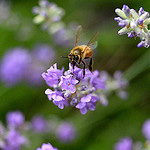Porter on “Bees Matter” anti-regulation campaign
Posted: February 9, 2015
Categories: Food in the News

Credit: Patty O’Hearn Kickham, shared via Flickr with Creative Commons license.
An open letter to Canadians entitled “Bees Matter” was printed as a full-page ad in major newspapers last week. The letter, funded by lobby group CropLife Canada, was written on behalf of 28,000 farm families who plant neonicotinoid-coated seeds in over half of the province’s productive farmland. The Toronto Star’s Catherine Porter dug in to the letter’s claims on the safety of neonicotinoid pesticides: “Most are so delicately cherry-picked they seem purposefully misleading. Others, I’d say, are flat-out wrong.”
Below is an extended excerpt of Porter’s article:
“In a nutshell, this is what their letter says: Ontario bees are not dying. Their colony numbers are up since 2003, when neonicotinoid seed treatments entered the market. When Ontario bees do die, it’s because of parasites, diseases, bad nutrition, bad management but not neonicotinoids. The science supporting the regulation is bunk. And finally, the corn and soy farmers love bees more than anyone else, as the stewards of our land. […]
The truth is bees are dying at an alarming rate in Ontario. Last winter, commercial beekeepers lost 58 per cent of their hives. That was the apex of a worrying 12-year trend, during which a third of hives died off on average. Apiarists consider a 15-per-cent loss over winter the norm.
(It is true, as the letter claims, that reported deaths were down during last year’s spring planting. What it failed to mention: by the end of the year, reports of bee deaths were high again.)
The federal government’s Pest Management Regulatory Agency, which registers commercial pesticides, was worried enough about the bee deaths to conduct some field studies in 2012 and 2013. It discovered neonicotinoid residue on 70 to 75 per cent of dead bees. […] The agency’s working theory is that the dust is killing the foraging bees. But that’s not certain. It wants to examine the issue more.
The Ontario government is choosing the opposite approach. It’s called the precautionary principle. Sure, Queen’s Park isn’t 100-per-cent certain that neonicotinoids are behind the bee die-off. There are lots of outstanding questions, such as why treated corn and soybean seeds seem to be toxic to bees, while NNI-coated canola seeds are not. (This is why there are few reports of honeybee deaths in Western Canada, the land of canola but little corn or soybeans.) […]
A group of 29 scientists formed the Task Force on Systemic Pesticides to examine neonicotinoids. They reviewed 800 scientific papers on the pervasive insecticide. Their conclusion, released last summer: the chemicals are causing “significant damage” to not just pollinators like honeybees but also a wide range of species, including worms, snails and possibly birds. The threat, they said, was akin to that of DDT, the cancer-causing insecticide that was finally phased out in Canada during the 1970s, after a decade of scientific alarms.
The scientists called for an “urgent” reduction in its use.”
Read the full article, “Safety of neonicotinoids for bees and other creatures unclear” (February 6, 2015).
